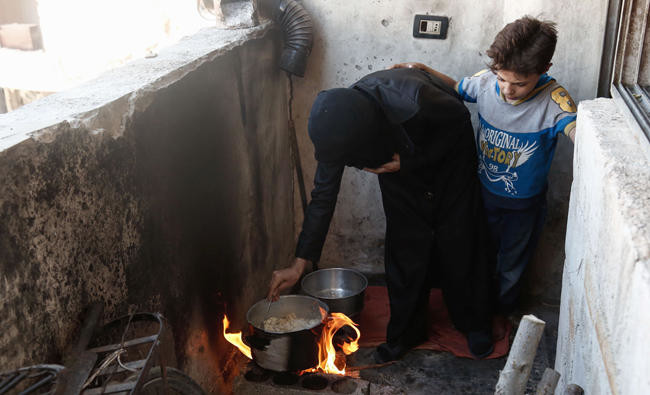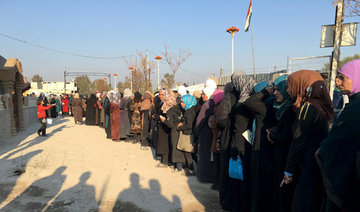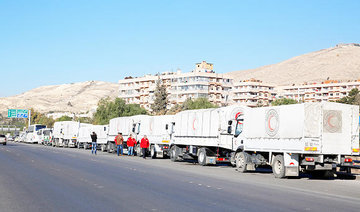DOUMA, Syria: In a humid room in the besieged Syrian town of Douma, Abu Nabil inspects the pearly white mushrooms sprouting from white sacks hanging from a ceiling.
The oyster mushrooms poking out from holes in the bags are now a substitute for meat in the fighter stronghold, where a government blockade has created food shortages.
Abu Nabil walks between the sacks inspecting the clusters of mushrooms emerging from the plastic and checking the internal temperature to ensure conditions are optimal for the unusual crop. Mushrooms are not a common crop in Syria, and rarely feature in local cuisine.
But in the Eastern Ghouta region, a key fighter bastion outside the capital Damascus, years of government siege have put traditional staples like meat far beyond the reach of ordinary people.
The Adala Foundation, a local NGO, began thinking about ways to help residents in need of nutritious alternatives.
“We turned to cultivating mushrooms because they’re a food that has high nutritional value, similar to meat, and can be grown inside houses and basements,” said Abu Nabil, an engineer who is project director.
“We were looking for a good source of proteins and mineral salts as an alternative to meat, which is very expensive,” added Adala’s director Muayad Mohieddin.
“We discovered the idea of mushrooms as a solution.”
Eastern Ghouta has been under siege since 2013, leaving locals to rely on food produced locally or smuggled in through tunnels or across checkpoints.
While the area was once an important agricultural region for Syria, mushrooms were not a local crop.
“This type of cultivation was totally unknown in Ghouta before the war,” said Mohieddin.
“We learned about it by searching on the Internet for places in similar (wartime) situations to Eastern Ghouta,” he added.
The NGO discovered mushroom farming required neither large amounts of space, nor major financial investment, making it a good fit for their needs.
To cultivate the mushrooms, the project’s workers begin by sandwiching thin slices of high-quality mushroom between pieces of carton and placing the samples in sterile plastic containers.
Over the course of 15-25 days, the mushroom slivers begin to process fungus that is then removed and mixed with sterlized barley grains to create “seeds.”
Next, straw that has been boiled until sterile and then drained is placed on a table and sprayed with gypsum to prepare it for the “seeds.”
Finally, the straw is packed into the sacks, with the mushroom starters sprinkled at intervals on top of the straw as it is layered in.
The bags are transferred to a room known as an incubator where they are suspended from the ceiling for between 25 to 45 days, and each produces between four and five mushroom harvests before being replaced.
The project relies on generators to keep conditions steady at 25 degrees Celsius and 80 percent humidity.
But with fuel also in short supply and expensive, the generators are fed with a locally produced fuel that is extracted from plastic.
In the three months since the project began, the NGO has distributed mushrooms across Douma and other parts of Eastern Ghouta free of charge.
“We distribute nearly 1,300 kilograms of mushrooms a week to 600 people,” said Abu Nabil.
“The distribution is free for the poorest families, and for those suffering malnutrition or spinal cord injuries that need lots of nutrients,” he added.
It’s a major boon for people like Um Mohammed, a mother of four, who can only dream of affording meat at prices of around $10 a kilogram.
“If you’re able to get mushrooms, it’s a huge blessing,” the 50-year-old said.
“It’s as though you’re eating a dish of fish or chicken or meat,” she added, preparing a dish in her sparsely furnished home, wearing a black robe and headscarf.
Abu Adnan Al-Sidawi, 30, had never even tasted mushrooms before he received them through the project.
“I received a bowl of mushrooms three or four weeks ago,” said Sidawi, who suffered multiple fractures in his leg and back in an airstrike in April.
“I didn’t know what they were and I’d never eaten them before. I learnt how to cook them from the Internet,” he said.
“On the first day, I fried them up with some onions, and on the second day, I cooked them in a yoghurt sauce,” he said, lying on a bed in his house.
“We liked them in the yoghurt sauce,” he said with a smile.
Like many adults in Douma, the city’s children were also unfamiliar with the ingredient.
At one psychosocial center, the children saw mushrooms for the first time when they were distributed during Ramadan, an employee said.
“I organized a small workshop to teach them about it and how it is cooked,” said the employee, who asked to be identified as Rasha.
“When I showed it to them, they said to me: ‘Miss, what is that? A flower?’”
Besieged Syria town swaps meat for mushrooms
Besieged Syria town swaps meat for mushrooms

‘Barefoot with nothing’: War-displaced Sudanese go hungry in refuge town

TAWILA: Crouching over a small wood-scrap fire in Sudan’s war-battered Darfur region, Aziza Ismail Idris stirs a pot of watery porridge — the only food her family have had for days.
“No organization has come. No water, no food — not even a biscuit for the children,” Idris told AFP, her voice brittle with fatigue.
Having fled a brutal paramilitary attack last month on Zamzam, once one of Sudan’s largest displacement camps, she and her five children are among the estimated 300,000 people who have since arrived in the small farming town of Tawila, according to the United Nations.
“We arrived here barefoot with nothing,” she said, recalling her escape from Zamzam camp, about a 60-kilometer (37-mile) desert trek away, also in the vast western region of Darfur.
The few aid organizations on the ground lack the means to meet the urgent needs of so many displaced people.
“Humanitarian organizations were simply not prepared to receive this scale of displacement,” said Thibault Fendler, who works with medical charity Doctors Without Borders (MSF) in Tawila.
Since war broke out in April 2023 between Sudan’s army and rival paramilitaries, the town has received waves of displaced people fleeing violence elsewhere.
“We are working to scale up our capacities, but the needs are simply enormous,” Fendler told AFP.
Tawila, nestled between mountains and seasonal farmland, was once a quiet rural outpost.
But the two-year war pitting the army against the paramilitary Rapid Support Forces (RSF) has buffeted the already-scarred Darfur region.
Entire displacement camps have been besieged and razed, while the armed group that controls the area around Tawila — a faction of the Sudan Liberation Movement, led by Abdelwahid Al-Nur — has vowed to protect those fleeing the violence.
The town’s schools, mosques and markets are crammed with people sleeping side by side, on concrete floors, under trees or in huts of straw and plastic, exposed to temperatures that can reach 40 degrees Celsius (104 Fahrenheit).
Beyond the town center, a patchwork of makeshift shelters fans out across the horizon.
Inside, families keep what little they managed to bring with them: worn bags, cooking pots or clothes folded carefully on mats laid over dry earth.
Some weary children play silently in the dirt — many malnourished, some dressed in oversized hand-me-downs, others in the clothes they had fled in.
Nearby, dozens of women line up with empty jerrycans, waiting by a lone water tank.
More queues snake around soup kitchens, with women carrying pots in hand and children on their hips, hoping to get a meal before they run out.
“When we arrived, the thirst had nearly killed us, we had nothing,” said Hawaa Hassan Mohamed, a mother who fled from North Darfur’s besieged state capital of El-Fasher.
“People shared what little they had,” she told AFP.
The war has created the world’s largest hunger crisis, with famine already declared in several parts of North Darfur state where the UN estimates that more than a million people are on the brink of starvation.
The RSF and the army continue to battle for control of territory, particularly in and around El-Fasher — the last army stronghold in Darfur — crippling humanitarian access.
“It takes a long time to get aid here. The roads are full of checkpoints. Some are completely cut off,” Noah Taylor, head of operations for the Norwegian Refugee Council, told AFP from Tawila.
“There are so many gaps in every sector, from food to shelter to sanitation. The financial and in-kind resources we have are simply not sufficient,” he said.
Organizations are scrambling to get food, clean water and health assistance to desperate families, but Taylor said these efforts are just scratching the surface.
“We are not there yet in terms of what people need,” he said.
“We’re doing what we can, but the global response has not kept pace with the scale of this disaster.”
Leni Kinzli, head of communications at the World Food Programme, said that a one-time delivery of “1,600 metric tons of food and nutrition supplies” for 335,000 people had reached Tawila last month.
But it took two weeks to reach the town, navigating multiple checkpoints and unsafe roads, she told AFP.
Aid workers warn that without urgent funding and secure access, these deliveries will even be harder, especially with the rainy season approaching.
Fierce clashes erupt in Libyan capital

- Officials released no information on potential casualties or injuries
- Residents urged to stay indoors
TRIPOLI: Violent clashes between rival armed groups erupted Monday night in the Libyan capital Tripoli, prompting the interior ministry to urge residents to stay indoors.
Heavy arms fire and explosions were heard in several areas of the capital from 9:00 p.m. (1900 GMT), AFP journalists in the city said.
Officials released no information on potential casualties or injuries.
The interior ministry of the national unity government in Tripoli in a statement urged “all citizens to stay at home for their safety.”
Local media said clashes broke out in the southern suburbs between armed groups from Tripoli and rivals from Misrata, a major port city 200 km (125 miles) east of the capital.
Libya is struggling to recover from years of unrest following a 2011 revolt that led to the fall of the late dictator Muammar Qaddafi.
It is currently divided between a UN-recognized government in Tripoli and a rival administration in the east, controlled by the Haftar family.
Despite relative calm in recent years, clashes periodically break out between armed groups vying for territory.
In August 2023, fighting between two powerful armed groups in Tripoli left 55 dead.
Several districts of the capital and its suburbs announced that schools would be closed on Tuesday until further notice.
Earlier Monday, the United Nations Support Mission in Libya and the United States Embassy in Tripoli called for calm.
They urged “all parties to de-escalate” and “refrain from any provocation, to resolve disputes through dialogue.”
Israel’s West Bank land registration is a tool for annexation, NGO says

RAMALLAH: An Israeli rights group has denounced a government decision to launch extensive land registration for parts of the occupied West Bank, saying it could help advance annexation of the Palestinian territory.
“It is a tool for annexation,” said Yonatan Mizrachi of the Settlement Watch project at Israeli nongovernmental organization Peace Now.
The West Bank, which Israel has occupied since 1967, has no comprehensive land registry, with some areas unregistered or residents holding deeds from before the Israeli occupation.
The Israeli security Cabinet on Sunday decided to initiate a land registration process in the West Bank’s Area C, which covers more than 60 percent of the territory and is under full Israeli control.
Though the process would likely take “years” according to Mizrachi, he said that Palestinians in Area C could lose land if Israeli authorities do not accept their claim to it.
This might lead to “a massive land theft,” Peace Now said, adding that the process could result “in the transfer of ownership of the vast majority of Area C to the (Israeli) state.”
“The Palestinians will have no practical way to realize their ownership rights,” the anti-settlement group said.
Some Israeli ministers have advocated the annexation of the West Bank, home to around 3 million Palestinians as well as some 500,000 Israelis living in settlements that are illegal under international law.
Finance Minister Bezalel Smotrich, a far-right politician who lives in a settlement, has said that 2025 would be the year Israel extends its sovereignty over parts of the West Bank.
To Mizrachi, the government’s decision was primarily “about ... the places where they want to expand settlements,” including in areas considered state land.
He mentioned remarks by Defense Minister Israel Katz, who praised the move in the official statement announcing it.
Katz said that launching land registration “is a revolutionary decision that brings justice to Jewish settlement in Judea and Samaria,” the biblical name that the Israeli government uses to refer to the West Bank.
The process will lead to the “strengthening, establishment and expansion” of settlements, Katz was quoted as saying.
He also said it would block “attempts to seize land” by the Palestinian Authority, which exercises limited self-rule in parts of the West Bank but not Area C.
Mohammed Abu Al-Rob, director of the Palestinian Authority’s communication center, said that the decision was “a dangerous escalation of Israel’s illegal policies aimed at entrenching its occupation and advancing de facto annexation.”
Area C is “an inseparable part” of the rest of the Palestinian territories, he said.
Abu Al-Rob called on the international community to “reject this unlawful decision and to take immediate, concrete action to thwart its implementation.”
Syria warns Kurds against delay in integrating into state

- Foreign Minister Asaad Al-Shaibani emphasizes that ‘our goal is not dominance but unification’
ANKARA: Syrian Foreign Minister Asaad Al-Shaibani has warned that postponing the implementation of an agreement between Syria’s new administration and Kurdish-led forces in the northeast would “prolong the chaos” in the country.
His remarks came as the Kurdistan Workers’ Party, or PKK, announced it was disbanding, an announcement the Kurdish-led Syrian Democratic Forces, which control swaths of north and northeast Syria, have not yet commented on.
The PKK’s move is “a pivotal moment” for regional stability, Al-Shaibani told a news conference in Ankara with his Turkish and Jordanian counterparts.
Syria is “implementing the national accord with the Syrian Democratic Forces and incorporating all areas under central state control,” he said.
In March, Syria’s President Ahmad Al-Sharaa and SDF chief Mazloum Abdi signed an agreement to integrate the civil and military institutions of the autonomous Kurdish administration in the northeast into the national government.
The deal, agreed three months after the overthrow of President Bashar Assad, is expected to be implemented by the end of the year.
“This process is complicated and sensitive, but it is necessary,” Al-Shaibani said, adding that “delaying the implementation of this agreement will prolong the chaos, open the door to foreign interference, and fuel separatist tendencies.”
“Our goal is not dominance but unification,” he said.
“We are keen on implementing this agreement, and we hope that the other side is seriously committed to implementing this agreement,” he added.
The SDF, the Kurdish administration’s de facto army, controls most of the oil and gas fields in Syria. The force maintains that it is independent from the PKK, but it is dominated by the Kurdish People’s Protection Units, or YPG, which Ankara views as a PKK offshoot.
After years of marginalization and repression under the Assad dynasty, the Kurds took advantage of the government forces’ withdrawal during the civil war, which erupted in 2011, to establish a semi-autonomous administration.
With US backing, the SDF played a key role in the fight against Daesh, which was defeated in its last Syrian territorial stronghold in 2019.
Al-Shaibani emphasized that “the unity of Syrian territory is non-negotiable, as Syria is an indivisible, unified state, sovereign over its land and will remain so.”
“The rights of Kurdish citizens will be preserved and guaranteed on an equal footing with the rest of the Syrian people,” he added.
Syria’s Kurds have criticized a temporary constitutional declaration announced in March and said the new government failed to reflect the country’s diversity.
In February, Abdi said an initial call for the PKK to lay down weapons and disband did not concern his forces.
Jordanian and Saudi army chiefs reaffirm military partnership

- Saudi Arabia is at the forefront of efforts to enhance regional security, says Jordanian commander
- His counterpart from the Kingdom reaffirms Riyadh’s commitment to tackling regional threats
LONDON: During talks on Monday, Maj. Gen. Yousef Ahmed Al-Hunaiti, chairperson of the Joint Chiefs of Staff of the Jordanian Armed Forces, and his Saudi counterpart, Gen. Fayyadh Al-Ruwaili, discussed military cooperation between their countries.
They considered ways in which cooperation might be enhanced and expertise shared, and addressed the development of strategic defense partnerships and coordinated efforts to tackle regional and international security challenges.
Al-Hunaiti reaffirmed the strong ties between the nations’ armed forces, and said that Saudi Arabia is at the forefront of efforts to enhance regional security, the Jordan News Agency reported.
Al-Ruwaili praised collaborative efforts to strengthen defense and security initiatives, and reaffirmed Riyadh’s commitment to tackling regional threats.
They were joined during their meeting at the Saudi Armed Forces headquarters in Riyadh by several senior officers from both countries.






















